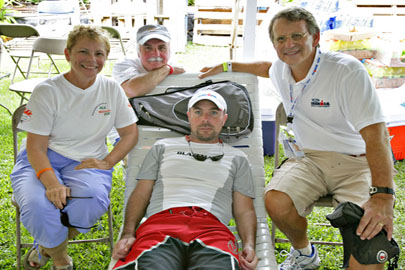Blazeman's 'War on ALS' comes to Brandeis
Mugdha Deshpande named the Blazeman Postdoctoral Fellow for ALS Research in the Rodal Lab

From left to right: Mary Ann Blais, Bob Blais, Jon Blais and Bob Laird, medical director for Ironman World Championship triathlon, in 2006
Thanks to a $274,100 gift from the Blazeman Foundation for ALS, Mugdha Deshpande has been named the Blazeman Postdoctoral Fellow for ALS Research and is utilizing a novel research approach developed in Assistant Biology Professor Avital Rodal’s laboratory to search for a cure to the neurodegenerative disease that ended Jon "Blazeman" Blais’ life in May 2007.
“We thank the Blazeman Foundation for its support of the innovative research being carried out by our scientists,” said Susan Birren, dean of the College of Arts and Sciences at Brandeis. “We look forward to our collaboration and the discovery of new biological processes that contribute to ALS.”
Relying on previous research into amyotrophic lateral sclerosis that uncovered a set of important cellular processes that cause degeneration when misregulated, Deshpande is studying how the membrane-bound packets carrying survival cues inside neuronal cells are formed, loaded and transported; how mutations that cause ALS affect these events; and how the events can be manipulated to treat the disease. She is employing genetic tools to attempt to manipulate the packets’ growth signals and transport machinery in fruit flies that have been engineered to model ALS in hopes of restoring the neurons to a healthy state. Deshpande will also collaborate with assistant biology professor Suzanne Paradis, an expert on mammalian neuronal development and synapse formation, to test how the findings from her fruit fly experiments apply to ALS models in mammalian neurons.
“We want to understand what has gone wrong with transport in neurons, and then go back and try to tweak these specific cellular defects back to a healthy state," Rodal said. “By funding this project for five years, the Blazeman Foundation has provided us with an unprecedented opportunity to fully explore what we think is a novel therapeutic strategy for ALS patients."
The Blazeman Foundation first learned of Rodal’s cutting-edge research when Bob Blais, Jon’s father, read a story in the Brandeis Hoot student newspaper about her winning a $1.5 million National Institutes of Health Director’s New Innovator award to help fund her lab for five years.
“We found that grants were being given to the same people and the same institutions,” said Bob, co-director of the foundation with his wife, Mary Ann. “Jon would always say, ‘Where is it written that one of these guys will give us the answer?’ He wanted us to find individuals who were thinking out of the box. That’s what we have done with this grant.”
When doctors diagnosed Jon with ALS in 2005, the 33-year-old immediately declared a “War on ALS.”® Recognizing that his efforts would likely not save his life but could help others, he founded the Blazeman Foundation to raise awareness and help secure funds to support research to develop treatments and a cure.
Five months after being diagnosed, he brought attention to the fight against ALS by fulfilling a long-held dream to compete in the Ironman World Championship triathlon (2.4 mile swim, 112-mile bike ride and 26.2-mile run) in Hawaii. Although he could not train for the race -- neurologists were concerned that his preparations might speed the course of the disease -- he recorded a time of 16 hours, 28 minutes and 56 seconds, punctuating his effort with a “log roll” at the finish line. “
Jon didn’t mind struggles,” Bob said of his son. “He went at them with a certain gusto that defined who he was. He fought many battles in his life. Adversity did not scare him. Part of one of the last poems he wrote sums up his life best, ‘Face your fears and live your dreams.’ ”
Categories: Research, Science and Technology





